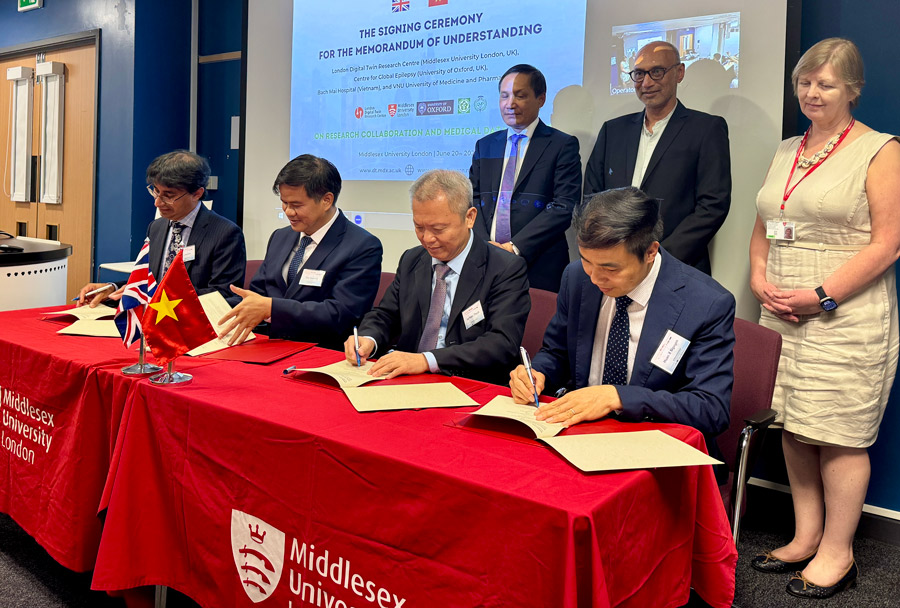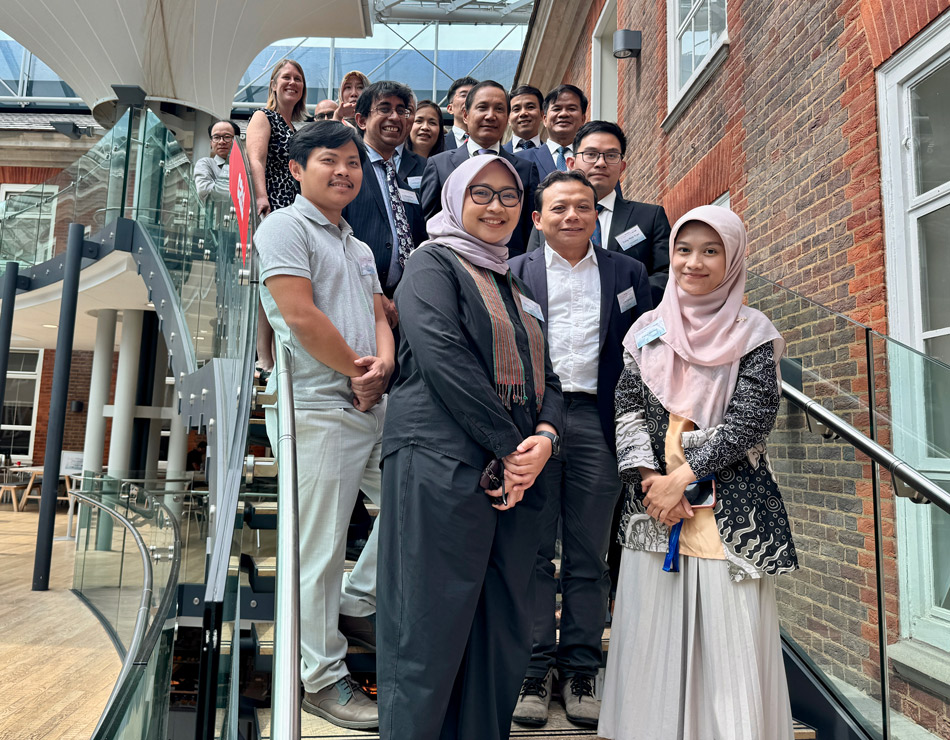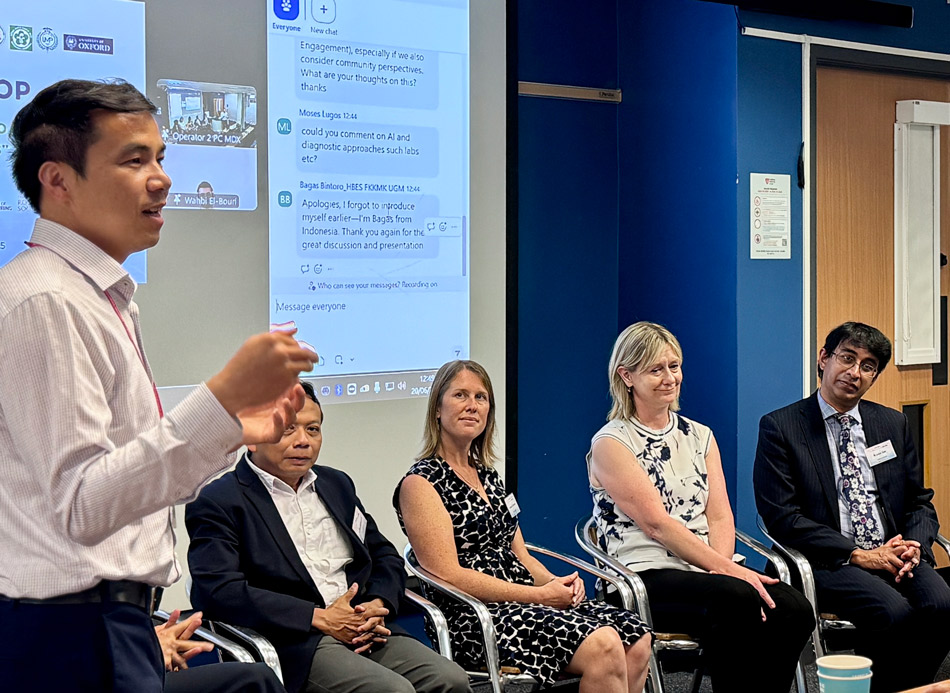Middlesex's London Digital Twin Research Centre forges partnership with Oxford and Vietnam on stroke care innovation
25 July 2025
/0x2:900x614/prod01/channel_3/media/middlesex-university/news-section-images/Digital-Twin-MOU-signatories-at-hybrid-workshop.jpg)
Digital Twin Stroke Care Network project will help hospitals diagnose patients more quickly and boost stroke awareness and education in South East Asia
Middlesex’s London Digital Twin Research Centre (LDTRC) – an inter-department collaboration, focused on technology that offers a digital realisation of the physical world – has held a hybrid International Workshop on Stroke Care for clinicians, researchers and institutional leaders from the UK and South-East Asia.
A highlight of the event, the signing of a Memorandum of Understanding between Middlesex, the University of Oxford and two Vietnamese institutions, paves the way for international cooperation in research, data sharing, and capacity building in stroke and epilepsy care.

The event in June, with attendees from Vietnam, Indonesia and Taiwan, was held under the auspices of the Digital Twin for Stroke Care Network, which is funded by the British Council’s International Science Partnerships Fund (ISPF), the Academy of Medical Sciences, the British Academy and the Royal Academy of Engineering.
The Network is committed to improving stroke prevention, service delivery, and rehabilitation using AI and Digital Twin.
The Memorandum was signed by Professor Huan Nguyen for Middlesex, Professor Arjune Sen, Professor of Global Epilepsy at the University of Oxford, and representatives of Bach Mai Hospital (Vietnam’s largest) and Vietnamese university VNU-UMP, which specialises in medicine and pharmacy.
Witnessing the signing were Vietnam’s Ambassador to the UK His Excellency Do Minh Hung, alongside Middlesex's Professor Janet Jones, Pro Vice-Chancellor for Global Research and Knowledge Exchange, and Professor Balbir Barn, Dean of the Faculty of Science and Technology.
Middlesex Professor of Digital Communications Engineering and Director of the London Digital Twin Research Centre Huan Nguyen said the MOU signing was “a big occasion and significant in many ways.
"We’re joining a world-class institution in Oxford University in committing to working in a strategic direction between UK and Vietnam, and the memorandum symbolises what we all want from both countries. Vietnam is an important country with a lot of medical data to work with.
“It’s so important to support doctors with technologies. Bach Mai Hospital treats more than 1200 stroke patients a month. Sometimes they are overwhelmed, and can’t give all patients an MRI or CT scan – they need technology to help decide who needs it most."

"We’re contributing to a national stroke programme in Vietnam. It’s vital to diagnose patients and give them the right treatment early – within four and a half to six hours - and technology can support this.
“Our platform also helps boost community awareness. Family members need to understand what’s going on with most likely older people. They need to know to bring them early enough to hospital for treatment."
The workshop featured two panel discussions: on Stroke Burden and AI Opportunities in Global Health, and on Data-Driven Stroke Innovation.
It was preceded by a strategic site visit to Oxford for LDTRC and South East Asian partners, to tour mechanical thrombectomy facilities for stroke care at Oxford University Hospitals and Oxford Robotics Institute.

At a seminar during the visit, the delegation presented ongoing work from the Digital Twin Stroke Care Network, including on the development of AI-based stroke care models, and the Oxford University Hospitals team shared their experiences in stroke treatment services and planning, and integration of AI technologies such as Brainomix 360 Stroke (the UK’s largest stroke AI network, serving more than 9 million patients).
Recently, LDTRC had a significant presence at both the 2025 IEEE International Symposium on Broadband Multimedia Systems and Broadcasting in Dublin, and an Institution of Engineering & Technology (IET) Space & Communications Week event in London.
In Dublin, Middlesex Associate Professor in Computer Science Dr Ramona Trestian presented and Professor Huan Nguyen delivered the keynote, on how Digital Twin models are poised to transform 6G network design (the planned successor to 5G, due to be developed and released by the early 2030s). Professor Nguyen addressed uses of Digital Twins in smart factories, precision agriculture and infrastructure monitoring, and the role of AI in scaling up Digital Twin approaches and delivering intelligent connectivity.
At the IET event in June, he gave an invited talk on Quantum-based Digital Twin for Open RAN (a shift in the telecommunications industry to open up systems that connect devices to the core network), as part of the British Council’s ISPF project with Japanese partners.
"The London Digital Twin Research Centre have led the way on building meaningful relationships with world class partners and are delivering on our institution mission for applying science for social good."
Professor Balbir Barn, Dean of the Faculty of Science and Technology
Find out more about the London Digital Twin Research Centre and studying Network Management and Cloud Computing at Middlesex University.


/8x0:1033x697/prod01/channel_3/media/middlesex-university/news-section-images/2026/Andy-Reed.jpg)
/8x0:1033x697/prod01/channel_3/media/middlesex-university/news-section-images/2025/LSID-LAUNCH-55.jpg)
/690x0:4783x2784/prod01/channel_3/media/Students-on-campus-(1).jpg)